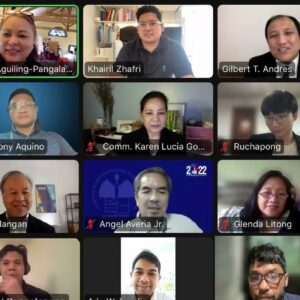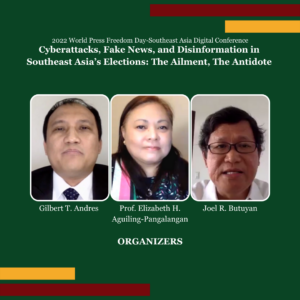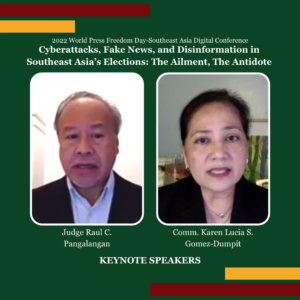Cyberattacks, Fake News, and Disinformation in Southeast Asia’s Elections: The Ailment, The Antidote
On the occasion of the 2022 World Press Freedom Day, the UP Law Center Institute of Human Rights (UP IHR), the Advocates for Freedom of Expression Coalition-Southeast Asia (AFEC-SEA), and the Center for International Law-Philippines (CenterLaw) hosted a virtual forum entitled “Cyberattacks, Fake News, and Disinformation in Southeast Asia’s Elections: The Ailment, The Antidote” on 3 May 2022 via Zoom and Facebook Live.
The delegates and attendees were welcomed by UP IHR Director Professor Elizabeth Aguiling-Pangalangan, AFEC-SEA Chairperson Atty. Gilbert T. Andres, and CenterLaw President Atty. Joel R. Butuyan. Professor Aguiling-Pangalangan observed that an increase in both “fake news” and cyber-attacks have become even more glaring during elections. “On one hand, we see rampant misinformation hiding behind the defense of free speech, while also seeing cyber-attacks against those who express unpopular or opposing views.” She reminded the audience that “freedom of speech is crucial in establishing a strong democracy” but that it is “not an absolute right and may be regulated.” Meanwhile, Atty. Andres pointed out that the attack against freedom of expression has become more fundamental since it targets truth and facts itself, thus a need for a social movement that guards freedom of expression against any forms of disinformation. Lastly, Atty. Butuyan pointed out that the marketplace of ideas has already been flooded with fake news and fake people, he cautioned that such will grow exponentially if nothing is done and things stay the same.
In his keynote address, former International Criminal Court Judge Raul C. Pangalangan noted the irony that social media trolls use free speech doctrine to undermine free speech itself and that whatever shape the antidote take, it will definitely involve increased regulation of free speech. He further raised important points on the nature and economics of social media as an information platform, and challenged the notion of private censorship as opposed to public regulation. The keynote address by Commissioner Karen Gomez-Dumpit of the Commission on Human Rights (CHR), meanwhile, reflected on how the CHR pushed back against the prevalence of disinformation that targeted the Commission. She mentioned how the increased social media communication capacity of the CHR and their engagement with non-traditional allies inspired other stakeholders to stand up against fake news.
Two panels of experts then discussed specific issues regarding election-related cyberattacks, fake news, and disinformation in the region. The first panel, moderated by Atty. Marlon Anthony Tonson of the Philippine Internet Freedom Alliance, discussed the weaponization of cyberattacks, fake news, and disinformation to influence election results. Atty. Gilbert T. Andres (AFEC-SEA) laid down the effects of disinformation in the Philippine context by stressing that an election may be won through fake news and that the country is now considered a patient zero for fake news. Mr. Ruchapong (iLaw, Thailand) shared that the government has now weaponized existing anti-disinformation laws to run after political dissenters. Mr. Sophorn Sek (Cambodia Center for Independent Media) gave similar insights on how broad and vague laws are used by the government to quell opposition. Mr. Ade Wahyudin (AFEC-SEA, Indonesia) further re-framed the discussion by emphasizing the role of traditional media in arresting the spread of disinformation. Mr. Khairil Zafri (Malaysian Center for Constitutionalism and Human Rights) also raised how the public is tolerant of false information. Atty. Andres synthesized the points raised and invited the public to reflect on whether additional laws are real antidotes in addressing the prevalence of disinformation.
The second panel, moderated by Atty. Rommel R. Bagares of the Philippine Society of International Law, continued to discuss the issues on the responses to systematic cyberattacks, fake news, and disinformation. Ms. Ellen Tordesillas (Vera Files, Philippines) shared the fact-checking process being done by her organization. She further emphasized the purpose and impacts of fact-checking in safeguarding the truth. Mr. Angel Averia, Jr (National Movement for Free Elections, Philippines) redirected the discussion toward the legislative efforts of the government to address the rise of disinformation. Mr. Ruchapong contextualized this in light of the Thai government’s sim card registration law which is being weaponized to silence political opposition. Mr. Khairil Zafri and Mr. Ade Wahyudin shared similar experiences in Malaysia and Indonesia, respectively. Atty. Roger Rayel (CenterLaw-Philippines) used legislative measures by the European Union as good examples of laws that could address the issue. Atty. Gil Anthony Aquino (UP IHR, Philippines) added that aside from legislation, there is also a need to establish mechanisms that would improve the public’s digital literacy. At the end of the session, Atty. Bagares synthesized the points covered and the issues addressed.
An open forum was then held where various issues such as public and private accountabilities were raised. Atty. Andres responded to these concerns by providing the audience with a “cocktail of antidotes” that addressed all stakeholders such as the government, cyber-trolls, and the public.
















































































































 on the upper right corner to select a video.
on the upper right corner to select a video.